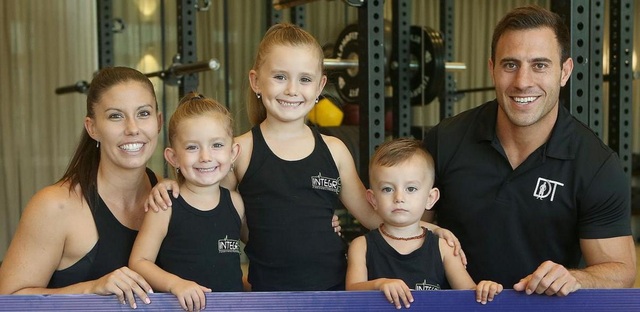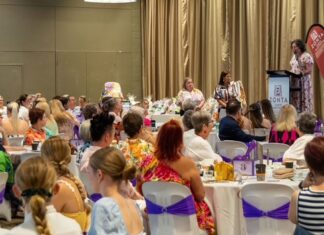Driven by a vision of a safer tomorrow and the legacy of Hannah Clarke and her children, Dave Kramer has pioneered the HALT Program – a ground-breaking Small Steps 4 Hannah initiative dedicated to empowering young people to champion safe and equitable relationships.
Through these extensive engagements in speaking and education, Dave, who is also a behavioural scientist, supports all people to take actionable steps towards cultivating a culture of safety and respect.
As a friend of Hannah Clarke, the inspiration for the HALT Program for Dave was to ensure a legacy is left for Hannah and her three babies that lasts beyond his lifetime.
“Most people know how strong and courageous Hann was because of the story they hear in the headlines, but many don’t know that she was kind, incredibly funny, and the most giving person on the planet,” Mr Kramer said.
“We also don’t get to hear about Aaliyah and the fact that she was very intelligent and through her resilience and intelligence she would’ve been a world leader.
“Little Laianah was a free spirit whose empathy was greater than most of us are capable of; she would’ve been a world traveller who made everyone in her company feel understood and safe.
“And tiny little Trey was full of love, for a three-year-old, his heart was bigger than anyone’s, and it was filled with love for his mum.
“He would’ve been the role model the young men of today need.
“My goal is to ensure the story of who they truly are is never lost within the story of what happened to them.
“Their legacy of leadership, kindness, love, and courage will outlast my lifetime.”
Interestingly for Dave, he has spent much of the time since the passing of Hannah and her children, reflecting on his relationship to her husband Rowan Baxter.
“I recognise that all the conversations I had with him towards the end of their lives should have been had much earlier,” Dave said.
“I hold no responsibility for what he did, that is on him.
“But I do know that men tend to fall into the trap of the ‘bro code’ and instead of holding their mates accountable for their behaviour, they make excuses for them.
“We need to learn how to hold ourselves and each other accountable to the contributions we make to a culture that supports violence against women, and understand that when we know better, we can do better.
“When I really thought about it, I realised that I was once a young man who was scared, insecure, and unsure about how to participate in safe and respectful relationships.
“I want young men to know they are allowed to feel their feelings, and there are healthy ways to express feelings like jealousy, fear, and sadness.
“On top of that, I want them to know they are not alone.
“Most young men have similar experiences of relationships, yet instead of turning to each other for support, we often see them isolating themselves.
“I want to help them break down the barriers to being safe and supportive, so they can not only participate in safe relationships, but also seek them help they need to do so.”
As a behavioural scientist and in order to maintain the legacy of Hannah and her children, Dave did not take the development of this program lightly.
Through his study in psychology, he looked to behaviour change and developmental theories to support and underpin its delivery.
“I conducted my own literature review of respectful relationships programs in Australia to gain an understanding of the current programs, goals, and outcomes.
“From there I had discussions with stakeholders within the space, and held focus groups with teachers as well as students (separately), which informed a pilot program that was delivered to a group of year 12 students in Brisbane.
“Through this process we have created a program that (in an age-appropriate context) helps young people develop agency in challenging the beliefs and attitudes that support violence. “To ensure young people can be successful, we also teach practical strategies to create a culture where all people within their community space feel safe and respected.
“The most successful aspect of the program so far, has been hearing the young people critically reflecting on the outside influences of their relationships.
“They are consuming content via social media and online platforms at astronomical rates, during a critical time of development, and this is not always a good thing.
“For many of them, doing our program is the first time they are given permission to think for themselves about their consumption of social media.
“When we invite this, they recognise the problems within much of the content they consume, and start to take agency over their own algorithm by looking for content that challenges the common narrative they are seeing.
“I’ve realised that when we give young people the right information and personal agency to choose, they will come together and choose to contribute to a safer community.”
As the team grows and the program develops, the HALT program will be able to reach people in a number of different ways including online and educating staff to facilitate the program effectively.
“My goal is to make this accessible for all young people, whether their school/institution has funding or not, whether they are engaged in the school system or not, and whether they live remote or suburban, we want to reach all young people.
“I am honoured to be part of the development and delivery of this program, but remember that all the stakeholders, teachers, and young people who informed The HALT Program are the real champions here.
“So too, are Sue and Lloyd (Hannah’s parents), who have worked tirelessly since losing their daughter and grandchildren, to ensure all women and children are safe.
“The HALT Program is a gift to them on behalf of myself and all those who made it possible.
“My hope is that it will continue the legacy of Hann and the kids by contributing something meaningful to all young people.”








